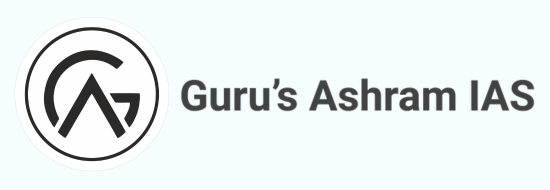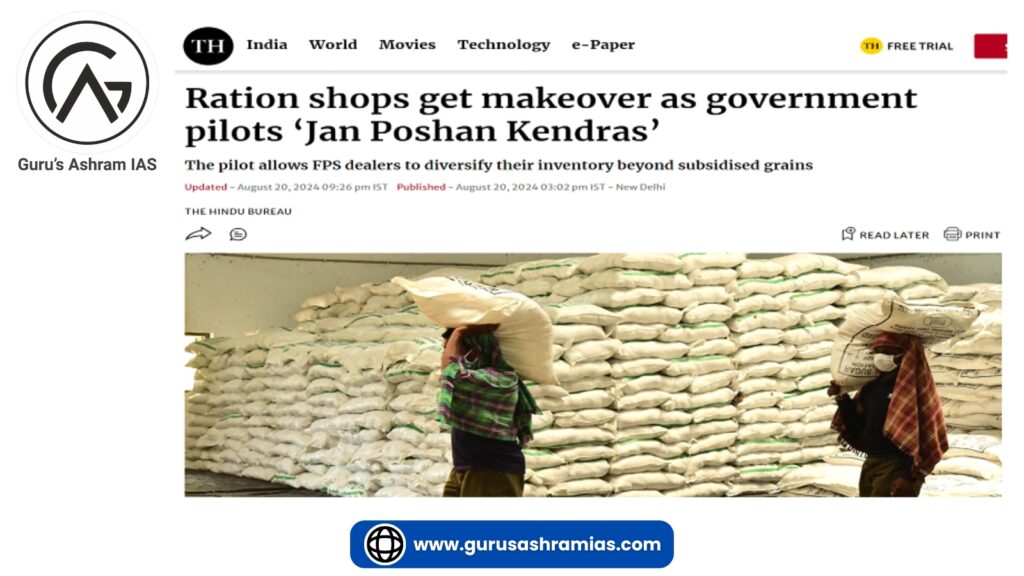Jan Poshan Kendra
- Recently, the Government of India launched a pilot project to convert 60 Fair Price Shops (FPSs) into “Jan Poshan Kendras” in Gujarat, Rajasthan, Telangana and Uttar Pradesh.
- The move is aimed at augmenting the nutritional services being provided to the beneficiaries under the Pradhan Mantri Garib Kalyan Anna Yojana (PMGKAY).
- The project also includes several new digital tools and support systems designed to enhance transparency and operational efficiency.
Jan Poshan Kendra initiative:
- Under this initiative, fair price shops will start selling additional items other than subsidized foodgrains to address the income challenges faced by ration dealers, as well as improve the nutritional services available to beneficiaries under PMGKAY.
- At present, 0.54 million FPSs distribute an average of 60-70 million tonnes of foodgrains annually free of cost to more than 800 million beneficiaries under PMGKAY.
- The government is likely to get additional income from FPSs as many people visit these shops to collect their monthly entitlements.
- Further, the Government aims to convert about 1,00,000 Fair Price Shops into “Poshan Kendras” in the next three years.
Main features:
- These centres will provide a diverse range of nutritious food items, including pulses and dairy products, besides subsidised foodgrains.
- 50% of the space in these centres will be allocated for storage of nutrition products, while the remaining space will be used for other household items.
- FPSs will receive loan and seed funding from Small Industries Development Bank of India (SIDBI) to support their replacement and operations.
- The initiative involves collaboration with organisations like Amul for dairy products and business-to-business e-commerce (or eB2B) platforms like Udaan and Jumbotail for supply of ingredients.
Several new digital tools have been incorporated in this initiative:
FPS Sahayata:
- It is an app to provide paperless, attendance-free and collateral-free financing to ration dealers.
My Ration App 2.0:
- App developed to provide information about the Public Distribution System to the consumers.
Quality Management system (QMS):
- QMS is a digital application for integration of quality control laboratories in Department of Food and Public Distribution (DFPD) and Food Corporation of India (FCI).
- QMS records all the major transactions happening during the stages of procurement, storage and delivery in real time.
- The introduction of digital tools and new systems is expected to enhance operational efficiency, transparency and quality control in the Public Distribution System.
Additional tools:
- DFPD has prepared a comprehensive handbook of quality control, which provides due details of various procedures, standards, roadmaps and policies to be followed to ensure strict quality standards of foodgrains of the Central Pool.
- Further, accreditation of National Accreditation Board for Testing and Calibration Laboratories (NABL) is important for departmental laboratories to comply with international standards, ensure quality and enhance customer confidence and satisfaction.
Pradhan Mantri Garib Kalyan Anna Yojana (PMGKAY):
- PMGKAY is an important initiative of the Union Government under the AatmaNirbhar Bharat programme launched in 2020 to mitigate the economic impact of COVID-19 pandemic on low-income families by providing free foodgrains in addition to regular allocation under the National Food Security Act (NFSA) 2013.
- PMGKAY initially provided additional free foodgrains to about 80 crore NFSA beneficiaries [including Antyodaya Anna Yojana (AAY) and Priority Households (PHH)].
- Each AAY beneficiary gets 35 kg foodgrains per month, while PHH beneficiaries get 5 kg foodgrains (per person per month).
- The scheme was implemented in seven phases during 28 months from April 2020 to December 2022. A total of 1,015 Lakh Metric Tonnes (LMT) food grains were distributed during this period.
- Earlier scheduled to end in December 2022, the scheme was extended till December 2023. Later, January 1, 2024, the Central Government decided to continue distribution of free foodgrains to about 81.35 crore beneficiaries under PMGKAY for the next five years.




